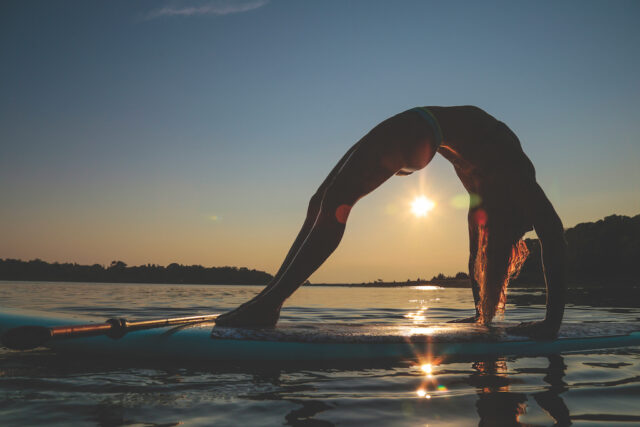
By Jim Servin
“The one game we all play is, ‘Don’t Die.’” Bryan Johnson, founder of Rejuvenation Olympics, is speaking via livestream, his porcelain countenance projected huge, like Oz the Great, on two screens at the Livelong Summit, held this March at the Palm Beach County Convention Center in Florida. The 46-year-old, whose doctors note that some markers show a biological age of 37—based on results gathered from DNA testing, and constant tracking of his 78 organs, BMI and white brain matter—is a major player in the longevity industry, one of its most celebrated and notorious figures. In his quest to Benjamin Button himself into immortality, or at the very least to make each of his living years the most vital they can be, he spends $2 million annually on body-boosting supplements, antiaging treatments, consultants and therapies. He keeps to a strict sleep schedule, eats all his meals before 11AM, and ingests over 100 supplements daily.
A multimillionaire father of three who made his fortune selling a payment platform to eBay in 2013, Johnson’s latest venture is Blueprint, an exploratory antiaging platform, and its offshoot, a competition created in 2023 known as the Rejuvenation Olympics, in which participants, about 4,000 of them, submit DNA information via a blood test. They compete against one another to see who can most quickly and effectively slow their age, according to biological markers. As the Rejuvenation Olympics website states, “You win by never crossing the finish line.”
Media focus on the Rejuvenation Olympics noted that founder Johnson fell from the top spot months into the race, bested temporarily by Julie Gibson Clark, a 55-year-old single mother from Phoenix who attained higher ranking, aging at rate of 0.65 of a year for every chronological year, compared to Johnson at 0.69, at a fraction of Johnson’s investment—about $108 a month to his $2 million a year. (He is currently No. 7 to her 8.) Clark follows a practical protocol of a morning workout, strength-training cardio, meditation, saunas, cold showers, green drinks and protein shakes. She consumes a pound of vegetables a day and takes antiaging supplements by NOVOS.
Is Bryan Johnson Oz the Great, or a humbug? “I personally consider him to be a genius,” says Livelong Summit attendee Amy Cherry-Abitbol, founder of the Water Mill’s luxury wellness resort Shou Sugi Ban House. Cherry-Abitbol has been compiling biological aging test data in order to compete in the Rejuvenation Olympics. “Bryan has some lofty goals,” she adds. “In terms of longevity, he’s not proprietary about his protocols, which makes me feel like he is sincere about wanting to help the greatest number of people. With a lot of longevity scientists, biohackers, you have to buy the information, or hire them as a very expensive coach. He puts it all out there for the public.”
Rejuvenation Olympics contestant Michael Lustgarten, a 51-year-old Boston-area scientist, currently in the race and ranked at No. 9, says that he’s been on the longevity track long before Bryan Johnson—as far back as 2015. DNA testing shows that he is aging at a rate of 0.8 of a year for every chronological year, “which isn’t as good as the lowest rate of 0.6,” Lustgarten says, “but better than age-expected. I’m also tracking diet and other biomarkers. I believe it’s only a matter of time before I make additional progress and move up the leaderboard via correlation analysis, repeating the process until I discover the recipe for a slower rate of aging.” He keeps his supplements to a minimum (vitamin D, occasionally B12 and niacin); his diet is rich in beets, collard greens and strawberries, with “smaller but potentially important roles played by sardines and chickpeas.”
The longevity market is currently valued at $26 billion, and predicted to double over the next decade. A steady stream of new products and protocols can be both exciting and stressful, says Cherry-Abitbol. “You’re taking 30 supplements, trying to figure out which one to have in the morning, with food, without food. I need to hire an assistant just for that.” She would rather not reveal her age, but Cherry-Abitbol says she was thrilled when recent DNA testing notified her that her body is aging at the rate of 0.55 a year for every chronological year. Her longevity protocol includes supplements recommended by integrative medicine specialist Dr. Neil Paulvin: Fatty 15 (“in lieu of fish oil”), CoQ10, vitamin D (“which you take with K2”), Urolithin A (“That’s a big one now. It gets rid of the senescent cells, the zombie cells in your body”), Mito-Q (“for cellular health”) and creatine (“for muscle building”). She champions resistance training—“It’s muscle strength that determines your biological age.” Of vital importance to female longevity, she says, is ovary health: “That’s the organ that ages most quickly and determines other aspects of aging.”
When asked about tangible results she’s achieved through biohacking, Cherry-Abitbol is realistic. “I wouldn’t say that I feel younger, but I don’t feel older. Other people my age complain about aches, pains, injuries…it’s like I escaped what some people think of as the inevitable weakening of the body. As people were feeling worse, I was not.” From the Livelong Summit in West Palm Beach, her biggest takeaway from the experts was the importance of scrutinizing research results. “Know what a product’s marketing budget is compared to its research budget,” she says. “If it’s larger than research, you need to be very skeptical.” rejuvenationolympics.com



